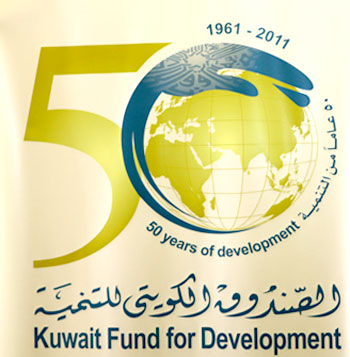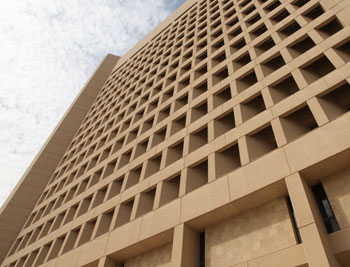Kuwait Fund: 50 Years of Aiding Countries in Development
Interview with Abdulwahab Al Bader, General Director of Kuwait Fund for Arab Economic Development.
Kuwait Fund for Arab Economic Development is celebrating its 50th Anniversary. Today, Kuwait Fund has more than 100 partner countries across the globe. The Fund is offering an aid to countries in development.
Kuwait Fund is celebrating its 50th anniversary this year. Can you briefly talk about your journey, milestones and past successes that you value the most?
A great deal happened over the span of 50 years. We cannot go over all the work done by Kuwait Fund during the last five decades, but we can highlight some major developments such as the expansion of the Fund’s development operations to include all developing country regions, as well as supporting their priority projects in various economic and social sectors. As of now our partners include 104 developing countries spread across the globe.
We take pride in assisting countries to fulfill their aspirations for a better life. We value every project in our multi-sectoral operations that can contribute to increasing the production of goods and services to meet human needs, such as food, electricity, water, transportation facilities, health and education services, as well as others.

Can you mention an occasion where Kuwait Fund really made a difference of which you are proud?
Every project that achieves great or modest objectives makes a difference. A large project such as the Marwai Dam which doubles electricity generation in Sudan makes a difference by promoting development in various sectors, and a small project for supplying drinking water to small villages in rural areas can have significant impact on alleviating poverty and improving health conditions. We are partners in development, and our work complements that of our partner countries, and work done by others in the field of development cooperation.
Do you think the role of Kuwait Fund is slowly changing with the new challenges of the 21st century, such as food security, economic uncertainty, environmental destruction, energy crisis… ?
There is always a change. Every now and then, we come up with an issue that needs working on. Still, let me tell you: challenges come and go, constantly changing, whether it’s food, energy or money.
In my opinion, the biggest challenge that we have is of social nature; socio-economic, more precisely, human resources. We have to take on all those challenges together and try to find the most suitable way of solving those problems. We need to be open-minded about the future.
We take pride in assisting countries to fulfill their aspirations for a better life.
Kuwait fund has a legacy of 718 loans supporting the health and sustainable development worth 4.4 billion KD (15 billion US$). This is your track record. Now, looking into the future, what do you expect to be your main challenges?
I think we are doing what could be qualified as never-ending work. We can never stop. Development is a long-term process. We expect to do much more in the coming years, and that is why we have already obtained an approval for increasing our work as well as our commitments. There is always something coming up which needs our input.
Societies go through problems which need to be dealt with. Some problems might not allow us to reach our targets in the first years, but I’m sure we can learn from them to help us in the future to overcome other problems.
As you mentioned, you have succeeded in raising the excess of your funds for the next five years by the amount of 250 million Kuwaiti dinars. How do you characterize Kuwait’s foreign policy? What is your strategy for the next 10 years? What sort of role will you play in this strategy?
Kuwait’s foreign policy has always been open-minded and Kuwait Fund is guided by its principles of close cooperation and friendly relationships. We are open to everybody. We play a constructive part in the context of Kuwait’s foreign policy. The fact that Kuwait Fund supports 104 countries around the world is really an indicative statement of Kuwait’s foreign policy.

You mentioned that your distribution mainly revolves around Arab countries (54%), with 20% to Southeast Asia and Pacific countries, as well as 17% to African countries, and so on. Do you see this ratio changing, with the rise of Asia, for one?
It depends. We have increased our overall commitments, and at the same time, we are maintaining the 50% average distribution to Arab countries. However, by increasing our commitments, we hope to reach more countries and augment our presence there.
Where is the demand coming from mostly? From which countries?
Well, it is coming from everywhere. Arab countries, such as Egypt, Lebanon and Morocco, but also Asia and Africa in an increasing manner.
What is the percentage of non-performing loans in your portfolio? What is the financial situation?
That percentage is very small compared to our commitments and compared to the work we are doing. Our financial position is very good currently, which explains why we are increasing our commitments; if it were not the case, we would not be able to do more.
Kuwait fund does not get any support from the government. How do you manage to secure adequate funding for the Fund? Are you following a very successful business model that allows you to increase the funding that you provide to other countries?
We have not received financial support from the government for over twenty years, so we have been dependent on our own resources. Over the years, we have made good use of our cash position and our investments, whether in the local market or in the international market. At the same time, most of our current loans provide about 20% of our income, while 80% comes from our investment portfolio.
You are mainly concerned with the fields of transport, communication, energy and agriculture… What is the philosophy behind the allocation of the loans?
We try not to do all of the allocation ourselves. It depends on the recipient countries, which decide what our interventions will be, according to their priorities. We might have some wishes, but we respect their priorities. We leave it for them to decide which project they wish for us to help them with, as long as it is financially and economically viable.
Do you see this structure changing in the future?
Not so much, but yes, I do see a little bit of change.
How do you assess your financial performance for 2012 and beyond?
2012 might not be financially favourable, but overall I do not expect a very big difference coming along.
What is your opinion of the Arab Spring, the major events that took place last year?
I have to be positive about what happened in the Arab world. I think those are good changes. Most changes involve disruption, a situation which is only natural, but we hope in the end a new climate emerges for development and prosperity.